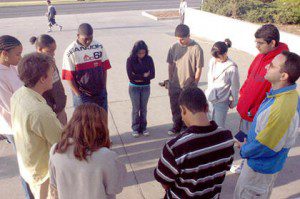
A proposal to permit students to pray or deliver “inspirational messages” at school events was approved by a Senate committee Wednesday, over strong objections from groups dedicated to protecting religious freedoms.
The bill (SB 98) allows school boards to adopt rules allowing the messages, which could include prayer, at “non-compulsory” school events, such as graduations or football games. The bill says school personnel may not participate or influence decisions over what type of message is delivered.
Only Sen. Ellyn Bogdanoff, R-Fort Lauderdale, who is Jewish, voted against the measure, in the Senate PreK-12 Committee on Wednesday. The measure still has several committee stops before going to the full Senate.
The bill encountered fierce opposition from groups such as the American Civil Liberties Union and the Anti-Defamation League, both of which argued the proposal violates constitutional protections that separate church and state and will have the effect of ostracizing students who do not support the majority’s religious views.
“We must guard against the promotion or endorsement of one particular set of religious beliefs over others,” said Ron Bilbao, a spokesman for ACLU. By letting students choose the type of message, it “submits religious expression to a popular vote,” he said.
Bill sponsor Sen. Gary Siplin, D-Orlando, said he wants to “formalize” school prayer policies to “allow students to get together to have some benediction or invocation” during some school events.
But opponents to the bill say that by putting a policy in place that supports school prayer, it could run afoul of the state and federal constitutions, which expressly prohibit public institutions from supporting religion.
The bill opens the state up to lawsuits, warned ADL lawyer David Barkey.
“It advances religion, it coerces religion in violation of the establishment clause,” Barkey said, referring to a provision in both the state and federal constitution that is designed to prevent laws that promote or favor certain religions in public settings. “It sets up the state and our school districts for litigation, which is unfair.”
This is the third year Siplin has suggested this bill, and last year it did not come up for a vote in the Senate or House. This year, Siplin said it has a better prognosis. “I think it will pass,” he said. “The (House Speaker) appreciates prayer and the (Senate) President appreciates prayer.”
By Lilly Rockwell


